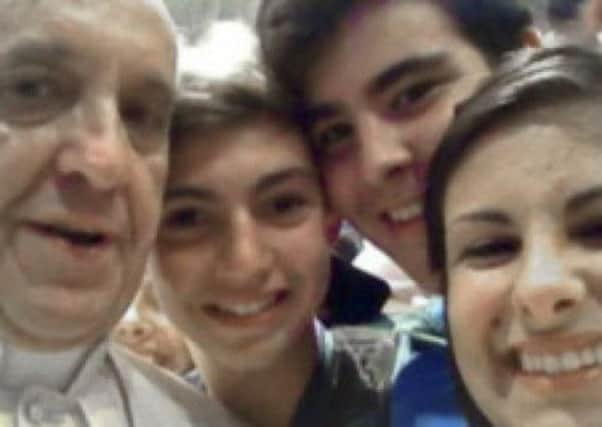Emma Cowing: Selfies not only for the self-absorbed


In fact, anyone in possession of a mobile phone with a camera who claims not to have taken the odd selfie is either lying, or has yet to figure out how the reverse camera feature works (in which case, they probably shouldn’t be allowed a mobile phone in the first place).
So it is not surprising that the Oxford English Dictionary has declared “selfie” to be the word of the year, beating off such stiff competition as “twerking” (ugh) and “binge-watching” (pardon?) as a noun that, more than any other in our modern lexicon, defines 2013.
Advertisement
Hide AdAdvertisement
Hide AdWhat a legacy that’ll be for the history books, eh? In 2435, when the humans of tomorrow look up the stand-out events of the early 21st century on their iPad 632 Airs, and read that the most important thing we did in a year in which thousands of people perished in a horrific typhoon and the British government created a tax that punishes individuals for having a spare bedroom in their house was to take pictures of ourselves.
Perhaps then, we shouldn’t be surprised that the earliest known use of the word selfie, as tracked down by the Oxford English Dictionary, was this literary masterpiece, discovered on an Australian online forum post from 2002, which relates in Proustian detail the events leading up to someone taking the world’s very first selfie.
“Um, drunk at a mates 21st, I tripped ofer [sic] and landed lip first (with front teeth coming a very close second) on a set of steps. I had a hole about 1cm long right through my bottom lip. And sorry about the focus, it was a selfie.”
It’s not the focus I would be apologising for, although it is rather fitting that someone who felt the need to share a photograph of a 1cm-long hole through their bottom lip with the world came up with a word so self-absorbed, so smug, so utterly all-about-me, as selfie.
The problem – OK, one of the problems – with selfies is that they are horribly addictive. There is something reassuring about being able to take a selfie. It acts as an independent witness that can confirm your existence, an “ah, there I am” marker that testifies you were indeed at a party/One Direction concert/falling up a set of steps at a mate’s 21st. Selfies have become so ubiquitous that it is as though without them memories unravel, become vague and unreliable. Was I really at that party? Did so-and-so really put their arm around me during that song? I know, I’ll look at my mobile phone and check. Otherwise, it might not really have happened.
I’m as guilty as the next person when it comes to taking selfies. I have snapped them for such wide and varied reasons as wanting to check my makeup and not having a mirror and because sometimes it’s the only way to get everyone in the picture. One of my favourite selfies is a snap I took of myself, my cousin and her baby girl on a chilly autumnal morning as we strolled through the Wiltshire countryside. There was no-one else around and were it not for the wonder of the selfie, that moment – both of us smiling, heads together, the baby giggling up at the camera – would have been lost forever.
So selfies are harmless then. Well, up to a point, Lord Copper. Because a quick glance at social media sites reveals that for the younger generations they’re not just an occasionally useful tool. They are a mandatory way of proving your existence to the world that is focused entirely on image. Selfies say “Look at me. Judge me.” A quick glance at the Twitter feeds of modern celebrities including Rihanna, Katy Perry and Kim Kardashian reveals that they are chock full of selfies, all of which are then followed by endless comments, speculation and discussion of how “hot” or otherwise said celebrity appears. Unsurprisingly, their fans have aped this behaviour, posting thousands of pictures of themselves in the hope of attracting some of the attention bestowed upon their idols.
I may occasionally use selfies as a mirror, but for many they act as a mirror on the world that tells them whether or not they are good enough. It is a dangerous legacy, and one that shows no sign of fading.
As the Oxford English Dictionary rightly pointed out, selfies are here to stay. I just hope their depressing sentiment isn’t.